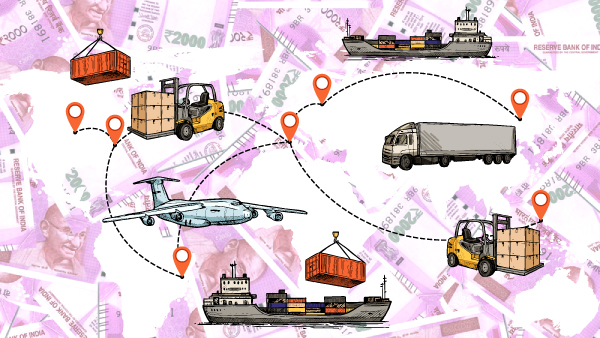In a recent development, the discontinuation of the Rs 2000 currency notes by the Indian government has sparked discussions about its impact on various sectors. The sectors that have emerged relatively unscathed from the decision is the Logistics and Supply Chain. Contrary to initial speculations, companies offering Logistics and Supply-Chain services have successfully navigated the currency transition without significant disruption to their operations.

The logistics industry, responsible for the efficient movement of goods across the country, relies heavily on smooth financial transactions to ensure timely deliveries. However, the logistics sector swiftly adapted to the changing financial landscape, making the discontinuation of Rs 2000 notes a minor hurdle rather than a major setback.
Mukesh Singh, founder of LogisticMart, commented, "While there was initial concern about the impact of the Rs 2000 note ban, we have witnessed minimal disruption in the logistics and supply chain industry. Our sector has embraced digital payment solutions, alternative denominations, and advanced technologies, allowing us to continue our operations seamlessly."
One key factor contributing to the industry's resilience is the widespread adoption of digital payment methods. With the rapid growth of the digital ecosystem in India, logistics companies have readily embraced digital platforms to facilitate their financial transactions. From online banking and mobile wallets to UPI and electronic fund transfers, cashless transactions have become the norm. This transition has ensured that the logistics industry remains unaffected by the discontinuation of the Rs 2000 notes.
Moreover, logistics companies have readily shifted their focus to alternative denominations, such as Rs 100, Rs 500, and coins. These smaller denomination notes are readily available, enabling the smooth flow of cash transactions within the industry. The quick adaptation to alternative denominations has further mitigated any potential impact on the industry's day-to-day operations.

Another significant aspect contributing to the industry's resilience is the integration of advanced technologies. Logistics companies have long embraced technological solutions to optimize their operations, resulting in reduced reliance on cash transactions. Fleet management systems, GPS tracking, and electronic documentation have streamlined processes and paved the way for efficient cashless operations. This tech-savvy approach has made the logistics industry well- prepared to overcome challenges, including currency transitions.
Mukesh Singh emphasized, "The logistics industry has always been at the forefront of embracing technological advancements. Our ability to leverage technology, coupled with the industry's agile nature, has ensured a seamless transition during the discontinuation of the Rs 2000 notes."
Furthermore, the logistics industry's proactive approach has contributed to fostering a cashless economy. By encouraging digital payment options and embracing transparent financial transactions, logistics companies have actively supported the government's vision of reducing black money. This commitment to driving a cashless economy has not only mitigated the impact on the note ban but has also contributed relentlessly to the overall growth and development of the logistics sector.
The notion that the discontinuation of the Rs 2000 notes had a significant impact on the logistics industry is debunked by industry insiders. The logistics and supply chain industry's resilience serves as a testament to its adaptability and innovative spirit, reinforcing its crucial role in the nation's supply chain.